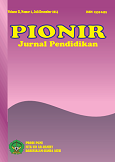EFEKTIVITAS BELAJAR DARING SISWA SD BANDA ACEH-ACEH BESAR PADA MASA PANDEMI COVID 19
DOI:
https://doi.org/10.22373/pjp.v9i2.8993Keywords:
E-Learning, TeacherAbstract
At the end of 2019, the world was shocked by the emergence of a deadly virus; (Coronavirus Disease 19 (COVID 19). Since its emergence, the Indonesian government issued a policy set out in Government Regulation Number 21 of 2020 concerning Large Scale Social Restrictions. One of the policies is to stop learning activities at school, that is replaced by online learning at home. This regulation has been stated in the Ministry of Education and Culture Circular Letter number 15 of 2020; "the aim of implementing learning at home is to ensure the fulfillment of students' rights to get educational services during the Covid 19”. The This study, therefore, aimed to figure out the effectiveness of learning at the homes of elementary school students in the city of Banda Aceh and Aceh Besar during the Covid 19 pandemic and to analyze the respond of students’ elementary school parents toward the learning process conducted at home during the Covid 19 disease. This study is a qualitative approach using a survey method. The results of this study indicate that during online learning, teachers use the WhatsApp application more for learning, and less do video conferencing with students, however, some teachers still accompany students to learn online and also provide clear work instructions to students. Another result found that teachers experienced many obstacles, such as unstable internet networks, and th parents who did not understand children's learning materials, and more than 80% of elementary school teachers in Banda Aceh and Aceh Besar cities did not agree with the online learning process, due to the online learning more effective to be applied in elementary schools.
References
Fathurrohman, Pupuh dan Sobry Sutikno. 2009. Strategi Belajar Mengajar Bandung: PT Rafika Aditama.
Peraturan Pemerintah Nomor 21 tahun 2020 tentang Pembatasan Sosial Bersakala Besar
Riyanto, Y. 2009. Paradigma Baru Pembelajaran. Jakarta: Kencana
Sardiman. 2008. Interaksi dan Motivasi Belajar Mengajar. Jakarta: Rajawali Pers.
Slameto. 2016. Belajar dan Faktor-Faktor yang Mempengaruhi. Jakarta: Rineka Cipta
Sugiyono. 2019. Metode Penelitian Kuantitatif, Kualitatif dan R&D. Bandung: Alfabeta
Surat Edaran nomor 15 tahun 2020 tentang pedoman penyelenggaraan belajar di rumah
Suwartono. 2014. Dasar-dasar Metodologi Penelitian. Yogyakarta: Penerbit Andi
Downloads
Published
Issue
Section
License
- Authors retain copyright and grant the journal right of first publication with the work simultaneously licensed under a Creative Commons Attribution License that allows others to share the work with an acknowledgment of the work's authorship and initial publication in this journal.
- Authors are able to enter into separate, additional contractual arrangements for the non-exclusive distribution of the journal's published version of the work (e.g., post it to an institutional repository or publish it in a book), with an acknowledgment of its initial publication in this journal.
- Authors are permitted and encouraged to post their work online (e.g., in institutional repositories or on their website) prior to and during the submission process, as it can lead to productive exchanges, as well as earlier and greater citation of published work (See The Effect of Open Access).

